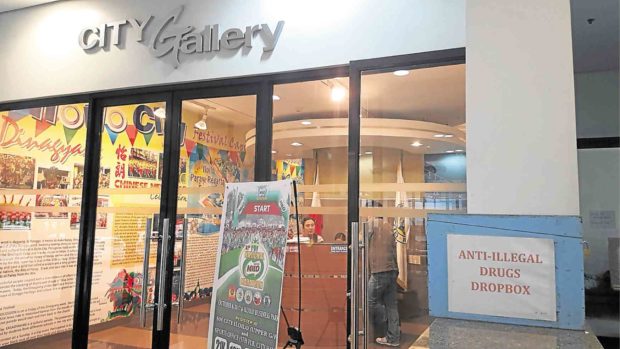
A drop box for names of drug suspects at the information counter at the lobby of Iloilo City Hall. —NESTOR P. BURGOS JR.
ILOILO CITY—A proposal to distribute boxes to collect drug suspects’ names through anonymous notes or letters rang alarm bells among human rights advocates here.
The city government had placed the so-called drop boxes in police stations, villages and government offices to entice citizens to report drug activity or suspects through anonymous notes or letters.
“Anyone whose name is placed in the box could be subjected to surveillance and put on a drug list,” said Reyland Vergara, secretary general of the human rights group Karapatan in Panay.
“Worse, the scheme could be used in personal conflicts among villagers, employees and even in schools,” he said.
Vice Mayor Jose Espinosa III, acting mayor in lieu of Mayor Jed Patrick Mabilog’s absence, said three names had been mentioned in notes dropped in a box at the lobby of the Iloilo City Hall.
Officials, though, have yet to determine how to validate the anonymous reports.
Initially, the plan was to submit names to the Philippine Drug Enforcement Agency (PDEA) and the Philippine National Police which, in turn, would ask those named to take drug tests.
Espinosa, however, said he has yet to issue an order that would serve as a guideline on how to validate the anonymous reports.
“We are careful not to violate anyone’s rights,” he said.
The guidelines would include inviting those named in anonymous notes to take drug tests.
The drop box was placed at the City Hall lobby to encourage the city government’s 2,000 employees to report any colleague suspected of using or selling drugs.
Only the City Hall’s chief of security, Felix Muchada, was authorized to open the box and validate its contents.
Drop boxes are also being distributed in police stations, offices and villages as part of the Philippine National Police’s war on drugs.
Supt. Gilbert Gorero, spokesperson of the PNP in Western Visayas, earlier said the drop boxes would help encourage community involvement in the campaign against drugs.
He said village officials could hesitate to come out in the open to identify drug suspects or could even be afraid. It was also possible that their relatives were involved, too.
The Commission on Human Rights (CHR), while saying it fully supports the war on drugs, also expressed apprehension over the use of drop boxes and the placing of “drug-free” stickers on houses’ walls or doors.
Anonymous reports collected from the boxes, a CHR statement said, “may expose an individual to mistaken arrest if the information is not verified and court processes are not involved.”
“In the same way, residents of a house with no drug-free sticker may be unduly discriminated, or tagged as drug users or pushers without due process,” said the agency.
“This also violates the right of any person to be heard before he is condemned,” it said. “A person’s honor, as well as the reputation of his family, would also be harmed,” it added.

